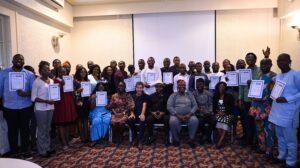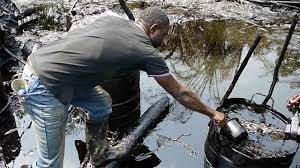Danger as Nigeria lags while the world hunts for alternative energy

EnergyDay Editorial Board
Recent developments in the global climate space has left no one in doubt that except man takes drastic action to address some of his actions, the earth may not be conducive for habitation.
From the ranging wide fire causing rapid destruction of the California forest in the United States, Turkey in Europe, Canada in North America down to Australia, as well as the floods ravaging the Asian countries, Europe and Africa has all been attributed to global warming, no thanks to the negative implications of carbon emission caused by the use of fossil fuel to drive industrialization.
Confirming the potential danger arising from increasing advocacy for the reduction in the use of fossil fuel, the Secretary-General, Organisation of Petroleum Exporting Countries (OPEC), Dr Mohammed Sanusi Barkindo, acknowledged the growing clamour for energy transition.
The Nigerian OPEC scribe in a keynote address at the 2021 Nigerian Oil and Gas conference said due to the uncertainty and volatility brought by the COVID-19 pandemic in relations to climate change and energy transition some countries are adapting various strategies to mitigate the danger ahead.
Speaking on the theme: “Global oil market dynamics in a decarbonising world,” Barkindo described the development of renewables energies as a welcome development.
He noted that “investors environmental lobbyists and even some corporate boards are pressuring oil companies and governments to pursue radical policies and initiatives,” but warned that such could, “in the end, be more disruptive than productive for the global energy industry.”
“There have recently been calls for investments in oil and gas to be discontinued, which is a dangerous and unrealistic scenario,” Barkindo said.
He added that these voices have emerged particularly in the context of the net-zero 2050 emissions discussions.
Although, the OPEC scribe submitted that oil and gas still have an important role to play in the energy transition. Nigeria must trend the part of caution and advance with every opportunity and challenges that life throws at us.
There’s no gainsaying in the fact that the black race led by Nigeria has lagged behind in economic and social advancement because we have refused to act while others do. We’re comfortable with mediocrity, hence we depend on others to take the lead and we follow.
For us at EnergyDay, it is instructive that the OPEC boss understands the need to make a radical leap into the renewable energy, while not halting investments in oil and gas. Barkindo has bought in to the reality, and has kept himself abreast of the nuances involved in steering the country away from fossil fuels, should be enough wake up call for our policy makers to transcend the shibboleth of being frozen in time and rigidity of oil for ever mentality, when the whole world is moving away from that to emissions-free renewable energy.
The key challenge for us now is our inability to get our act together for post -oil and gas world just the way far-sighted advanced countries of the world are already getting out from the logjam of oil and becoming more expressive in renewable energy discourse in tandem with current realities.
In the eight National Assembly, Senator who represented Bayelsa East, Senator Ben Murray Bruce, in a strident tone advised that we make a gradual transition from fossil fuels to renewable energy, but his was a minority voice in the wilderness, and was not heard.
The implication is that we failed to take advantage of a course for advancement, waiting for the dictate of hard economic realities to teach us bitter lessons in the future.
UN report shows human activities has changed the planet forever. We must act now to keep global warming below 1.5° Celsius and avoid the worst impacts of the climate crisis.
Human activities has changed our planet forever. Devastating wildfires, severe flooding, and extreme heat as we currently witnessing in parts of the world—all occurring more frequently—serve as a grim confirmation: the climate crisis is here.
A new comprehensive report by the United Nations Inter-governmental Panel on Climate Change assessing the latest state of global climate science, reveals that global temperatures now hover around 1.1°C above pre-industrial levels and our actions have already irreversibly altered the earth.
Though it’s still possible to limit warming to 1.5° Celsius and avoid even more devastating changes to our environment, we can only do so by acting immediately and aggressively to curb greenhouse gas emissions.
EnergyDay is not oblivious to the fact that sea levels continue to rise, and scientists cannot exclude a multi-feet increase in the next century if we do not drastically cut emissions. As global temperatures continue to creep upward, we’ll see these impacts more regularly and with potentially greater devastation.
We just need the political will for urgent and scaled-up action to reduce emissions right now. We can achieve this through rapid and deep cuts to greenhouse gas emissions, protection and the restoration of nature, cut our emphasis on oil and tilt towards renewable.
Cutting greenhouse gas emissions can help prevent the most extreme impacts of a warming planet, reduce pollution, improve air quality, and benefit our health in myriad ways.
This medium want to emphasize that the extent to which we cut greenhouse gas emissions now will directly affect the vulnerability of current and future generations and the wide array of the planet’s plant and animal life.
For the Buhari administration, time is running out, the opportunity to limit temperature rise to 1.5°C is very slim, but it is scientifically still possible if we take urgent and strong action. This publication urges the current administration to immediately raise the ambition of their short and long-term country pledges under the Paris Agreement to limit global warming to 1.5°C.
This is the moment for policymakers to act on the overwhelming evidence of dangers we currently face and will continue to confront if the world fails to reduce emissions and adapt to the impacts of climate change.
Not too long ago, the International Energy Agency (IEA) has projected that renewable energy will contribute 22 per cent of Africa’s total energy consumption by 2030. It noted that about 580 million people in sub-Saharan Africa lacked access to electricity in 2019.
The agency which disclosed this during a recent virtual meeting, also stated that Africa faces a massive energy challenge, while noting that the continent is richly endowed with renewable energy sources.
Director of Huawei Southern Africa Digital Power Business, Huang Su, stated recently that there was urgent need to accelerate the growth of renewable energy across the region to ensure sufficient, affordable, reliable energy supply for individuals, businesses, and communities.
He said that there is still a massive gap to be bridged, adding that the traditional energy infrastructure operation mode cannot meet the new challenges brought by the latest development in the digital world.
He added that digital technology could be of great help to ensure we provide sufficient electricity to every African household and business.
According to him, “The cost of PV power generation has fallen sharply over the past decade. In most countries, traditional energy grids cost a lot more than PV electricity.
“This offers Africa an opportunity to harness its abundant potential of increasingly cost-competitive renewable energy to meet the growing demand for electricity and pursue a climate-friendly, needs-oriented power strategy.
“Renewable energy is much cheaper than fossil-fuel-based options, with a kilowatt-hour of solar power costing less than a Rand in South Africa. It is clear then, that solar power should and likely will play a large role in the world’s future power mix. In order to achieve this, Huawei is committed to introducing digital power solutions driven by digital technologies.”
Our policy makers should understand the global seismic changes in the importance of oil to many advanced countries that buy the product from us.
This newspaper feels the obligation to remind not only our leaders but also our teeming readers of the impact of climate change on advance countries, the floods in Europe and wide fires in parts of America and Asia.
Going forward, many of the nations already have a time line by which they will make a complete switch to renewable energy, with no need for our oil, thereby leaving unprepared countries like Nigeria in the lurch.
We must be serious for the sake of the economy to begin to consider alternative oil , we should encourage our tertiary institutions to begin a research on how to exploit renewable energy, and manage the transition from fossil fuels to renewable.





